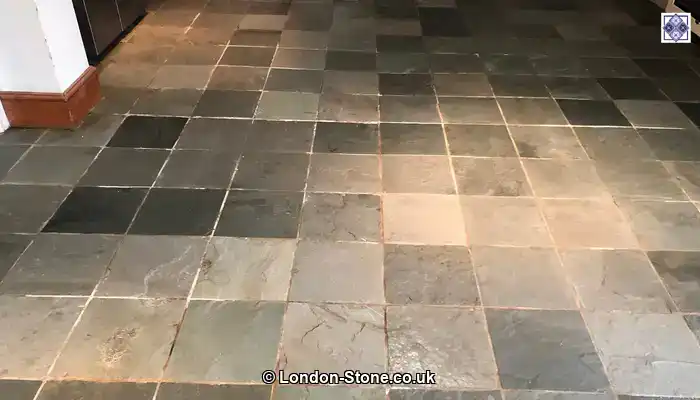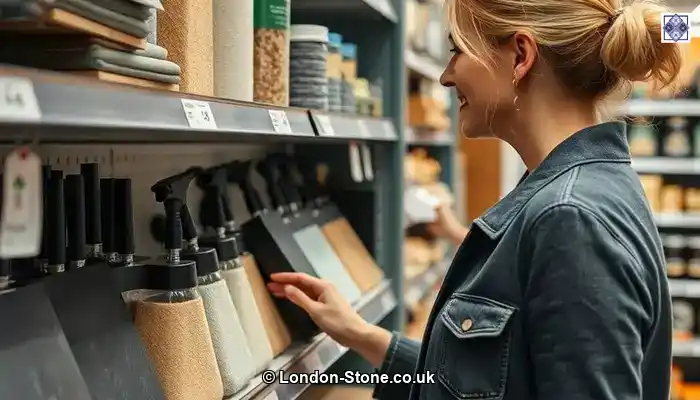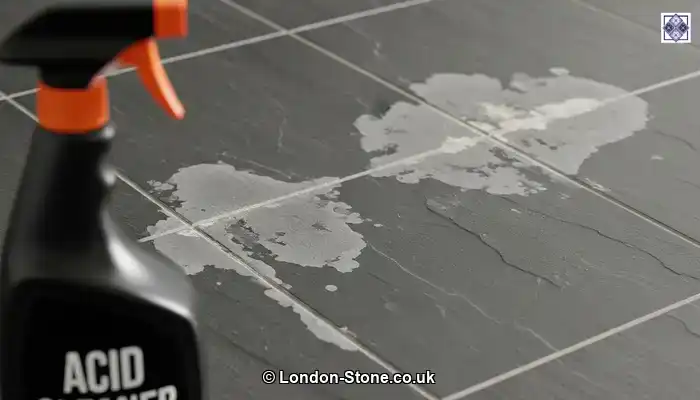Unlock Proven Techniques for Deep-Cleaning Slate Floors: A Must-Read Guide for Homeowners in London
-
- Specialised Maintenance Required for Slate Floors due to their unique porous and textured nature, which can trap dirt and moisture effectively.
- Employ pH-Neutral Cleaners for regular upkeep to avert damage to the stone or its protective sealants.
- Top Cleaning Products Recommended include Lithofin Wexa, Tile Doctor Pro-Clean, and StoneCare International Heavy Duty Cleaner.
- Customised Cleaning Strategies for Different Slate Finishes—riven slate holds more dirt, while honed slate benefits from gentler cleaning techniques.
- Proper Cleaning Techniques are Critical: use soft brushes, microfiber mops, and steer clear of steam or acidic solutions.
- The Significance of Sealing Slate after deep cleaning to guard against moisture, stains, and everyday wear and tear.
- Eco-Friendly Cleaning Options Exist, providing safe solutions for households with pets and children.
- Avoid Common Pitfalls such as Using Vinegar or Bleach, which can etch the stone and harm sealants.
- Powerful Cleaners like Grimex are effective in eliminating tough stains, including those from turmeric, wax, and rubber.
- Routine Maintenance Eases Care, with resealing recommended every 12–18 months to ensure optimal performance in London’s climate.
What Makes Specialised Care So Important for Slate Floors?

Slate is a highly valued natural stone, celebrated for its elegance and durability in flooring applications; however, its specific cleaning and maintenance requirements are often overlooked. Without appropriate care, slate floors can quickly lose their lustre and aesthetic charm. Regular upkeep is essential to maintain their stunning appearance.
Unlike ceramic or porcelain tiles, slate is a metamorphic rock characterised by a layered structure and varying levels of porosity. This special quality allows slate to absorb moisture and entrap dirt deep within its textured surface, particularly if the slate is riven (rough and split) compared to honed (smooth and polished). If not cleaned appropriately, dirt can accumulate, sealants may degrade, and the stone can appear dull or stained.
A frequent mistake made by homeowners is using generic or acidic cleaners. Products like vinegar, bleach, and certain “multi-surface” solutions can etch the stone, compromise protective sealants, and leave residues that attract more dirt. Steam mops are another common error; they can force moisture into the stone, causing long-term damage and discolouration.
Considering London’s climate, known for its high humidity and frequent rainfall, slate floors are particularly susceptible to damage. Organic debris such as mud and moss from gardens or conservatories can easily be tracked indoors. If the slate is not adequately sealed or cleaned, these contaminants can embed in the stone, making them extremely difficult to remove.
Grasping slate’s unique properties is fundamental for effective maintenance. This process encompasses more than mere cleaning; it involves preserving the stone’s natural beauty and structural integrity. This requires selecting the right products, employing appropriate techniques, and establishing a cleaning routine tailored to your home’s environment.
In the following section, we will delve into the best products available for deep-cleaning slate—those that are safe, effective, and recommended by professionals throughout London and beyond.
 Explore the Best Products for Deep-Cleaning Slate Floors
Explore the Best Products for Deep-Cleaning Slate Floors
When it comes to deep-cleaning slate, the effectiveness of products varies significantly. The most potent cleaners are specifically formulated for natural stone, employing pH-neutral ingredients that efficiently lift dirt without harming the stone or stripping away protective sealants. For homeowners in London, selecting the right product is particularly essential due to the region’s damp climate and high foot traffic.
Why is Using pH-Neutral Cleaners Crucial for Slate Maintenance?
Although slate is a robust and resilient stone, it is not immune to damage. Most varieties can endure mild acidic or alkaline exposure; however, if these substances linger on the surface for extended periods—or are used too frequently—they can gradually degrade the sealants and finishes that protect the stone. For routine maintenance, it is advisable to utilise a pH-neutral cleaner. These gentle solutions are considerate of both the slate and its protective coatings, ensuring your floors remain in prime condition over time.
Top-Recommended pH-Neutral Cleaning Products
- Fila Pro Floor Cleaner: A highly effective pH-neutral all-purpose cleaner, perfect for routine cleaning on sensitive surfaces.
- HG Natural Stone Cleaner 38: This concentrated mopping cleaner is pleasantly scented and ideal for maintaining slate tiles. It effectively lifts dirt and marks while restoring shine to polished finishes—without leaving any residue on non-shiny surfaces.
- Lithofin Easy Care: A versatile cleaning concentrate designed for regular use on almost any water-resistant surface within your home. Made with natural soap-based ingredients and gentle alkaline cleaners, it effectively removes everyday dirt and aids in maintaining and enhancing the appearance of your floors with continued use.
However, there are times when a more aggressive approach is required. If you encounter cement residue or efflorescence (the white, powdery deposits), a carefully selected acidic product can be beneficial. Just ensure to rinse the area thoroughly with clean water afterward to prevent any lasting damage.
Powerful Cleaner Brands Worth Considering
- Lithofin Wexa: This potent cleaner is excellent for removing wax, oil, and heavy dirt from slate. It has a strong solvent smell, so if you are using it indoors, ensure that the area is well-ventilated. Moreover, it’s wise to protect any sensitive or painted surfaces nearby, as this formula is intended for heavy-duty cleaning.
- LTP Grimex: A powerful cleaner specifically designed to tackle stubborn grime, grease, and dirt across a variety of surfaces, including slate.
-
<span id="productTitle" class="a-size-large product-title-word-break"><a href="https://amzn.to/45W5iVT">ECOPROTEC Cement, Grout & Salt Residue Remover</a>: </span>This fast-acting cleaning solution is specially formulated to tackle harsh residues like cement stains, grout haze, salts, and efflorescence. Whether you are dealing with light build-up or heavy deposits, it can be used diluted for routine cleaning or full-strength for more intensive jobs, providing flexibility without compromising results.
How to Choose the Right Product for Your Specific Slate Finish
Riven slate, with its rough texture, traps more dirt and necessitates a cleaner with strong emulsifying properties. On the other hand, honed slate benefits from gentler formulas that won’t leave streaks or residue. Always check the product label to ensure it is suitable for your slate type.
For London homes with outdoor slate patios or conservatories, opt for a product that is weather-resistant and designed for high-moisture environments. Many brands offer concentrated formulas that can be diluted for lighter cleaning or applied full-strength for deep-cleaning.
Next, we will discuss how to effectively utilise these products to achieve the best results without risking damage to your floors.
Perfecting the Application of Slate Cleaners for Best Results

Choosing the right product is only half the battle in the quest to deep-clean slate. To achieve optimal results and avoid damaging your floors, it is essential to apply those products correctly. Slate, being a natural stone, has unique characteristics, and improper cleaning techniques can lead to streaking, residue accumulation, or even long-term surface damage.
Your Step-by-Step Guide to Effectively Deep-Cleaning Slate Floors
Begin by removing loose debris. Sweep the floor with a soft-bristle broom or vacuum using a hard-floor setting. This step prevents grit from scratching the surface during wet cleaning.
Next, dilute your selected pH-neutral cleaner according to the manufacturer’s instructions. Most stone-safe products are concentrated and require mixing with warm water to activate them. Apply the solution evenly across the slate using a microfiber mop or a soft cloth. For heavily soiled areas, allow the cleaner to sit for several minutes to break down grime.
Utilise a soft brush or a non-abrasive pad to gently agitate the surface. Pay special attention to grout lines and textured areas where dirt tends to accumulate. Avoid scrubbing too hard, especially on honed or sealed slate, as this can wear down the finish.
Rinse thoroughly with clean water to eliminate any remaining cleaner. It is vital not to leave behind any residue, as this can attract more dirt and dull the stone’s appearance. Use a wet-dry vacuum or dry mop to eliminate excess moisture and allow the floor to air dry completely.
Essential Tools and Techniques for Outstanding Cleaning Results
The tools you select are just as critical as the cleaning solution itself. Microfiber mops are ideal because they effectively lift dirt without scratching the surface. For spot cleaning, use a soft sponge or cloth—never steel wool or abrasive pads.
For homes in London with outdoor slate patios or conservatories, consider employing a pressure sprayer with a low PSI setting for rinsing. This method helps remove stubborn dirt without damaging the stone. Always test any new tool or product on a small, inconspicuous area before applying it throughout the entire floor.
For extensive cleaning of larger areas, some homeowners opt for rotary scrubbers with soft-bristled attachments. These machines can be effective; however, they must be used judiciously and only with stone-safe products.
What Cleaning Methods Should Be Avoided? Acidic Cleaners and Steam Mops
Avoid using vinegar, lemon juice, bleach, or ammonia-based cleaners. These substances are too harsh for slate and may lead to etching, discolouration, and degradation of sealants. Even “natural” DIY solutions can present issues if they are acidic.
Steam mops represent another common error. While marketed as effective for hard floors, the high heat and moisture can penetrate the porous surface of slate, leading to cracking, flaking, or efflorescence over time.
Stick to gentle, proven methods, and always follow product guidelines. With the right approach, your slate floors will remain clean, vibrant, and protected—whether they are in a bustling kitchen, a tranquil hallway, or an outdoor garden room.
In the next section, we will explore the crucial importance of sealing your slate after cleaning, especially given London’s moisture-rich environment.
Why is Sealing Slate After Cleaning Absolutely Essential?
Deep-cleaning slate is merely part of the solution. To truly safeguard your floors and maintain their natural beauty, sealing is an indispensable final step. In moisture-rich areas like London, where rain and humidity are prevalent, sealing slate tiles helps prevent future staining, water damage, and premature wear and tear.
Slate is a porous stone, which means it can absorb liquids and oils if left unsealed. Even after a thorough cleaning, unsealed slate remains vulnerable to dirt reabsorption and moisture penetration. A high-quality sealant functions as a barrier, locking out contaminants while enhancing the stone’s colour and texture.
Key Advantages of Sealing Your Slate Floors
Sealing offers both aesthetic and functional benefits. Firstly, it enriches the natural hues of the slate, giving the surface a deeper, more vibrant appearance. Whether your tiles are riven or honed, sealing accentuates their depth and character.
On a functional level, sealants decrease porosity, making the surface more resistant to spills, dirt, and mould. This is especially critical in kitchens, hallways, and conservatories—areas that endure consistent foot traffic and exposure to moisture. In outdoor settings, sealing protects against algae growth and weather-related damage.
Sealed slate is also easier to clean. Dirt remains on the surface rather than sinking into the stone, allowing for quicker and more effective maintenance. This results in less scrubbing, reduced reliance on harsh chemicals, and an extended lifespan for your flooring.
Selecting the Right Sealer for London’s Unique Conditions
Not every sealer is suitable for slate, and choosing the wrong one can lead to issues such as discolouration, surface residue, or diminished breathability. If dampness is a concern, opt for a breathable, water-based sealer. These allow moisture vapour to escape while still protecting the surface from liquid penetration.
Search for products labelled “stone-safe,” “natural finish,” or “enhancing sealer,” based on your desired appearance.
If your slate is exposed to outdoor conditions, select a UV-resistant formula to prevent fading and weathering. For indoor applications, low-VOC sealers are ideal, particularly in homes with children or pets.
Guidelines for Application and Maintenance Schedule
Before sealing, ensure that the slate is clean and dry. Any residual moisture or debris can interfere with adhesion, resulting in uneven results. Apply the sealer in thin, even coats using a microfiber cloth, sponge, or roller. Allow each layer to dry thoroughly before applying the next.
Most sealers require a curing time of 24 to 48 hours. During this period, avoid walking on the surface and do not expose it to water. Once sealed, maintain the finish by using stone-safe cleaners and steering clear of abrasive tools.
Resealing should occur every 3 to 5 years, depending on foot traffic and exposure levels. High-traffic areas may require more frequent attention, while low-traffic zones can tolerate longer intervals between applications.
Proper sealing is paramount for the longevity of slate floors. In the next section, we will explore eco-friendly cleaning alternatives that protect both your stone and your home.
Explore Eco-Friendly and Safe Cleaning Solutions for Slate
As more homeowners in London seek sustainable methods to care for their residences, eco-friendly cleaning has become increasingly significant—especially concerning natural stone surfaces like slate. While deep-cleaning is essential for preserving the beauty and durability of slate floors, it is equally vital to choose products and methods that are safe for your family and the environment.
The porous nature of slate means it can absorb not only moisture and dirt but also chemical residues from harsh cleaners. Over time, these residues can damage the stone, affect indoor air quality, and pose risks to pets and children. Fortunately, a range of non-toxic, biodegradable cleaning solutions are now available that deliver powerful results without harmful side effects.
Non-Toxic Options Safe for Households with Pets and Children
When selecting a cleaner for slate, look for labels indicating that the product is pH-neutral, VOC-free, and safe for use around animals and children. These formulations are typically water-based and derived from plant-based ingredients, ensuring effective cleaning without leaving behind harmful chemical residues.
Brands like Lithofin and StoneCare International provide eco-conscious options specifically designed for natural stone. These products effectively eliminate dirt and grime without compromising the integrity of the slate or the health of your household. They are also less likely to trigger allergic reactions or respiratory issues, making them perfect for families with sensitive individuals.
In addition to cleaners, consider using sealants that are low in volatile organic compounds (VOCs). These minimisers protect the stone while reducing chemical exposure, and many are now available in recyclable packaging to lessen environmental impact.
Brands and Packaging with a Focus on Sustainability
Eco-friendly cleaning encompasses more than just the contents of the bottle—it also includes how the product is produced. Seek out companies that prioritise sustainability in their manufacturing processes, such as utilising renewable energy, minimising water usage, and offering refillable containers.
Several brands provide concentrated formulas that can be diluted at home, reducing the need for single-use plastic and minimising shipping emissions. These products are not only better for the environment but also more economical over time.
For homeowners in London looking for an additional sustainable approach, DIY cleaning solutions can serve as a safe alternative, provided they are used correctly. A simple mixture of warm water and a few drops of washing-up liquid can be effective for light cleaning. However, always test it on a small area first and avoid anything acidic or abrasive.
Opting for eco-friendly products is a wise decision to safeguard your slate floors while embracing a more sustainable lifestyle. In the next section, we will address the most common questions homeowners have regarding slate maintenance, ensuring you feel confident in your cleaning routine.
Frequently Asked Questions About Slate Floor Cleaning
Slate flooring is a popular choice in London homes due to its natural beauty and durability. However, because it is a porous, textured stone, it necessitates specific care to stay clean and protected. Below are answers to some of the most frequently asked questions homeowners have about maintaining their slate floors.
Is Vinegar Safe for Cleaning Slate Floors?
No. Vinegar is acidic and can damage slate by etching its surface and breaking down sealants. Although it is often recommended for general household cleaning, it is not suitable for natural stone. Using vinegar on slate can lead to dull patches, discolouration, and long-term erosion. Always opt for pH-neutral cleaners that are specifically formulated for stone surfaces.
How Often Should I Deep-Clean My Slate Floors?
For most London homes, deep-cleaning slate floors every three to six months is ideal. High-traffic areas, such as kitchens, hallways, and conservatories, may require more frequent cleaning. Regular sweeping and light mopping with a stone-safe cleaner can help maintain cleanliness between deep cleans. If the floor starts to look dull or feels sticky underfoot, it’s time for a deeper clean.
What is the Best Mop for Cleaning Slate Tiles?
Microfiber mops are the best choice for slate. They effectively lift dirt without scratching the surface and use minimal water, which is crucial for porous stone. Avoid sponge mops, which can push dirt into grout lines, as well as steam mops, which can introduce excessive moisture and heat that may damage the stone and compromise sealants.
Do I Need to Reseal After Every Deep Clean?
Not necessarily. The frequency of resealing depends on the type of slate, foot traffic levels, and environmental conditions. In London, resealing is recommended every 12 to 18 months for indoor floors, and more frequently for outdoor areas. After a deep clean, inspect the surface—if water no longer beads up or the colour appears faded, it’s time to reseal.
Can I Use DIY Cleaning Solutions on Slate Floors?
Yes, but with care. A mild mixture of warm water and castile soap can work well for light cleaning. However, always test any homemade solution on a small, hidden area first. Avoid anything acidic, abrasive, or oil-based. DIY solutions should not replace professional-grade products for deep cleaning or restoration.
What Should I Do If My Slate is Already Stained?
If stains have penetrated the stone, professional restoration is often the most effective solution. Experts based in London can use advanced equipment and stone-safe products to lift embedded grime, remove stains, and reseal the surface. Trying to remove deep stains with household products may worsen the damage or yield uneven results.
Understanding how to care for slate properly is critical for preserving its natural beauty and extending its lifespan. In the following section, we will summarise key strategies and suggest next steps for homeowners eager to protect their slate floors over the long term.
The Article What Is the Best Product for Deep-Cleaning Slate Floors? Expert Tips for Surrey Homeowners first appeared on https://london-stone.co.uk
The Article Best Product for Deep-Cleaning Slate Floors: Expert Tips for Surrey appeared first on https://fabritec.org
The Article Deep-Cleaning Slate Floors: Expert Tips for Surrey’s Best Product Was Found On https://limitsofstrategy.com
References:
Deep-Cleaning Slate Floors: Expert Tips for Surrey’s Best Product



